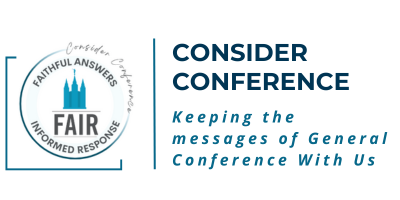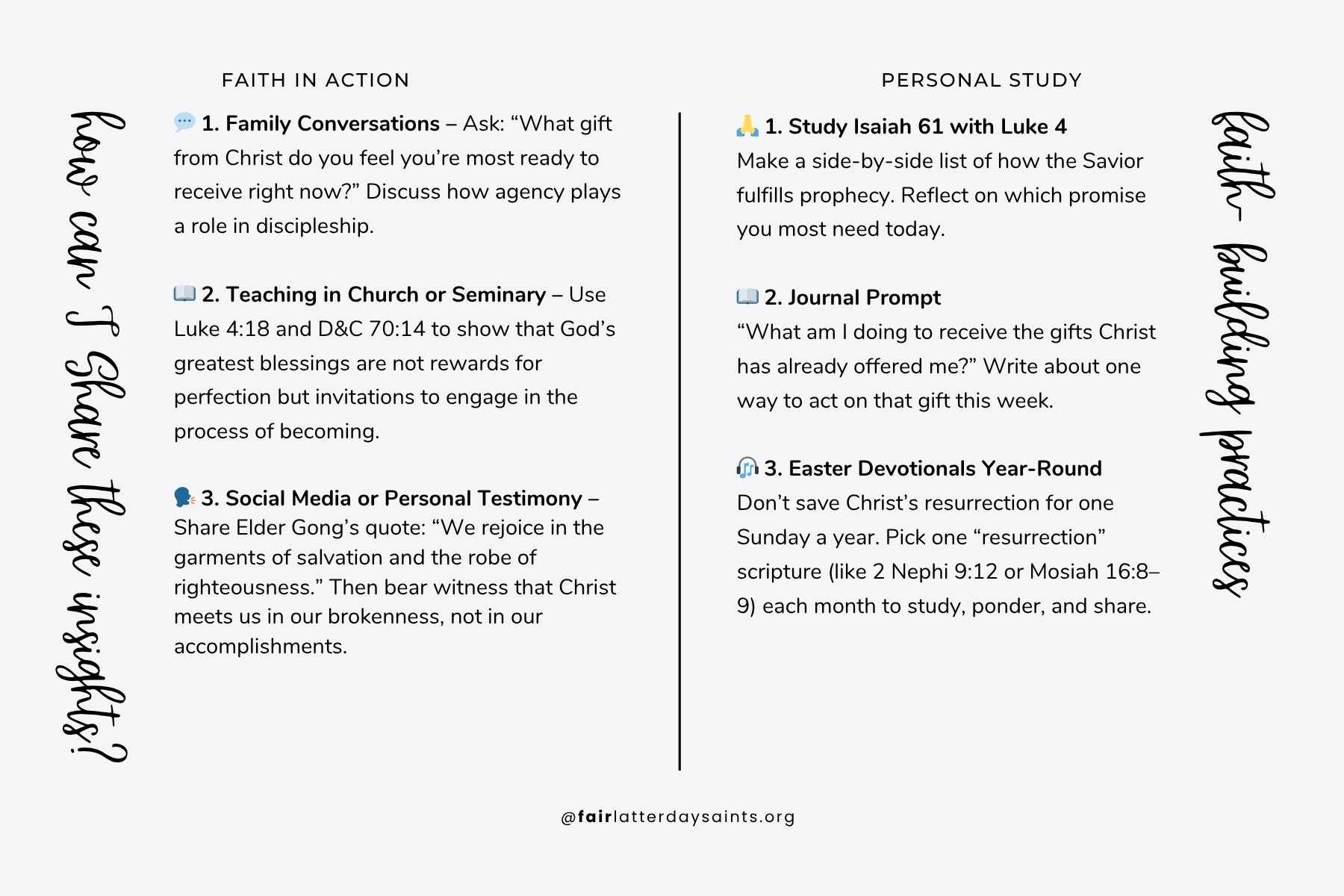Receiving Eternity’s Gifts Through Christ
Have you ever felt that no matter how much you believe in Christ, His promises feel just out of reach—like peace, healing, or wholeness belong to someone holier, stronger, or more deserving?
In his Easter message Eternity’s Great Gifts: Jesus Christ’s Atonement, Resurrection, Restoration, Elder Gerrit W. Gong of the Quorum of the Twelve Apostles offers a sweeping and tender reminder: God’s eternal gifts are not reserved for the perfect—they are extended to all. What matters most is not whether the gift is offered (it is!) but whether we are willing to receive.
Drawing from Isaiah’s vision of “beauty for ashes” and the Savior’s declaration in the synagogue that He came to “heal the brokenhearted,” Elder Gong teaches that the Atonement, the Resurrection, and the Restoration are not distant doctrines—but deeply personal invitations. Through Jesus Christ, each of us—poor, brokenhearted, captive, blind, bruised—can be made whole.
As we study Doctrine and Covenants 67–70, Elder Gong’s message resonates with striking power. What does it mean to receive what Christ offers? And how does our willingness, not our worthiness, shape our eternal destiny?
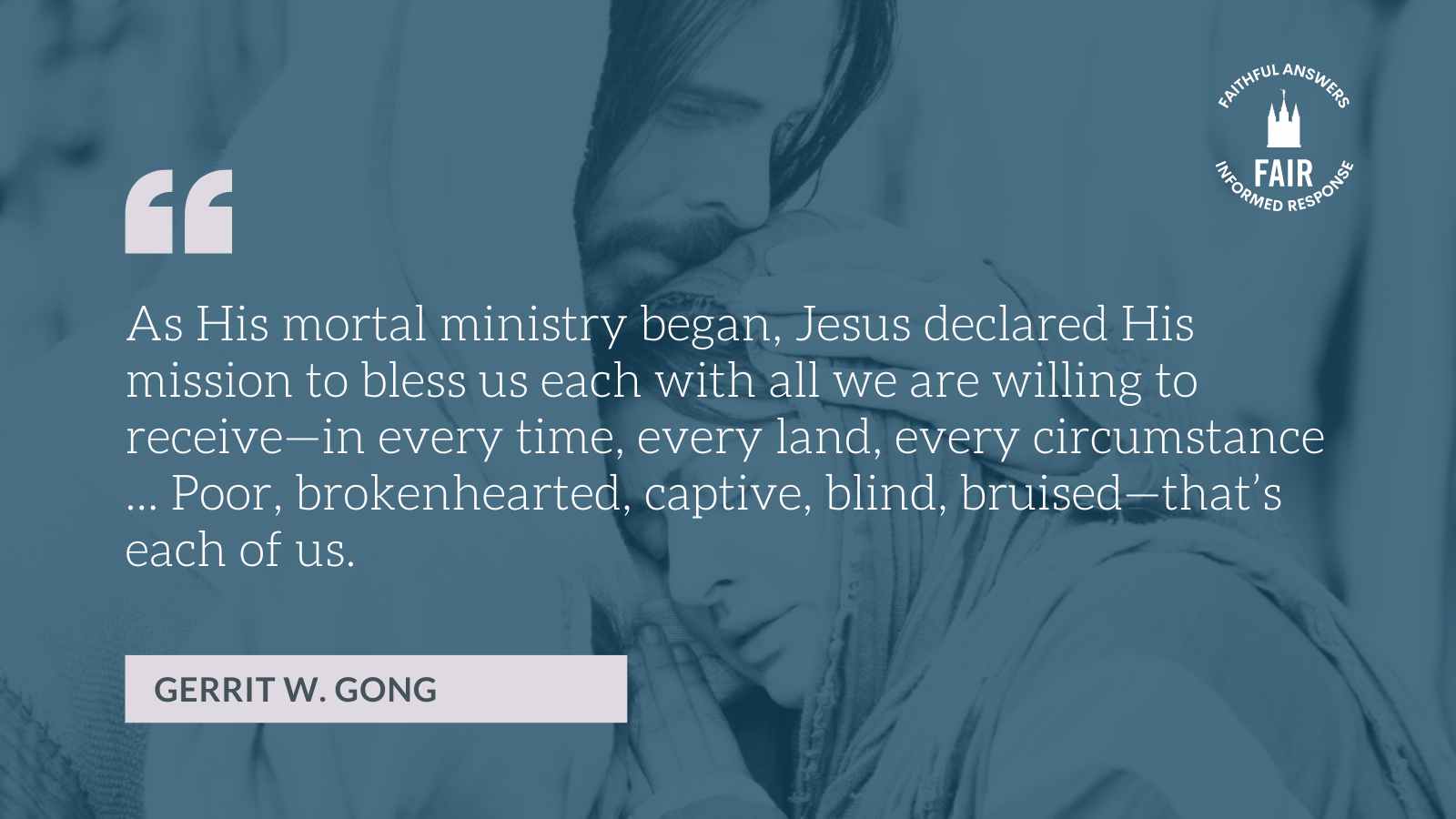
Apologetic Issues: Receiving Salvation & Blaming the Church
Criticism: If God truly loves all His children, why doesn’t He just save everyone—regardless of their beliefs, choices, or covenants?
Response: While Christ’s Atonement, Resurrection, and the Restoration are extended to all, the Atonement and Restoration must be received. Elder Gong teaches that God “saves all the works of his hands” except those who willfully reject Him after receiving knowledge (D&C 76:43). This is not a restriction—it is a recognition of divine love that honors our agency. Salvation is offered freely, but God will not force it upon the unwilling.
In Elder Gong’s words:
Jesus declared His mission to bless us each with all we are willing to receive.
Receiving salvation requires a willing heart, not a flawless record. The gospel is not about earning heaven but accepting Christ’s gifts and following Him with purpose and intent.
Common Fallacy: Straw Man – misrepresents or oversimplifies another person’s argument in order to make it easier to attack or refute
This critique creates a Straw Man Fallacy by misrepresenting the doctrine of salvation as either universal or cruelly exclusive. In reality, Latter-day Saint doctrine teaches that God desires to save all, but will not violate our agency or override the natural consequences of our choices.
Solution: Recognizing that agency is instrumental to grace helps us appreciate both the justice and mercy of God.
Social Issue: Blaming the Church for Spiritual Discontent
Misconception: “I left the Church because the Church failed me. I didn’t feel seen, heard, or spiritually fulfilled.”
Response: It is deeply painful when people feel hurt, neglected, or unseen. But Elder Gong gently reminds us that while Christ always sees us, receiving His healing and guidance requires our active participation. Like the mourners who met the resurrected Christ in the garden or the brokenhearted He declared His mission to heal (Luke 4:18), we must come to Him.
The Savior offers garments of salvation and robes of righteousness—but He doesn’t force us to wear them. Some spiritual discontent comes not from what the Church failed to give, but from what we failed to seek. Rather than outsource spiritual growth to an institution, we are invited to claim our stewardship as disciples. The Church can support, but only Christ can transform—and only we can choose Him.
Common Fallacy: Attribution Error – the tendency to explain someone else’s behavior by blaming their character or intentions, while overlooking external circumstances or situational factors.
This reflects the Fundamental Attribution Error—blaming external systems (like “the Church”) for internal struggles without acknowledging personal agency or stewardship.
Solution: Taking spiritual accountability—our study, prayer, service, and effort—restores power to our discipleship and invites Christ to heal and guide us personally.
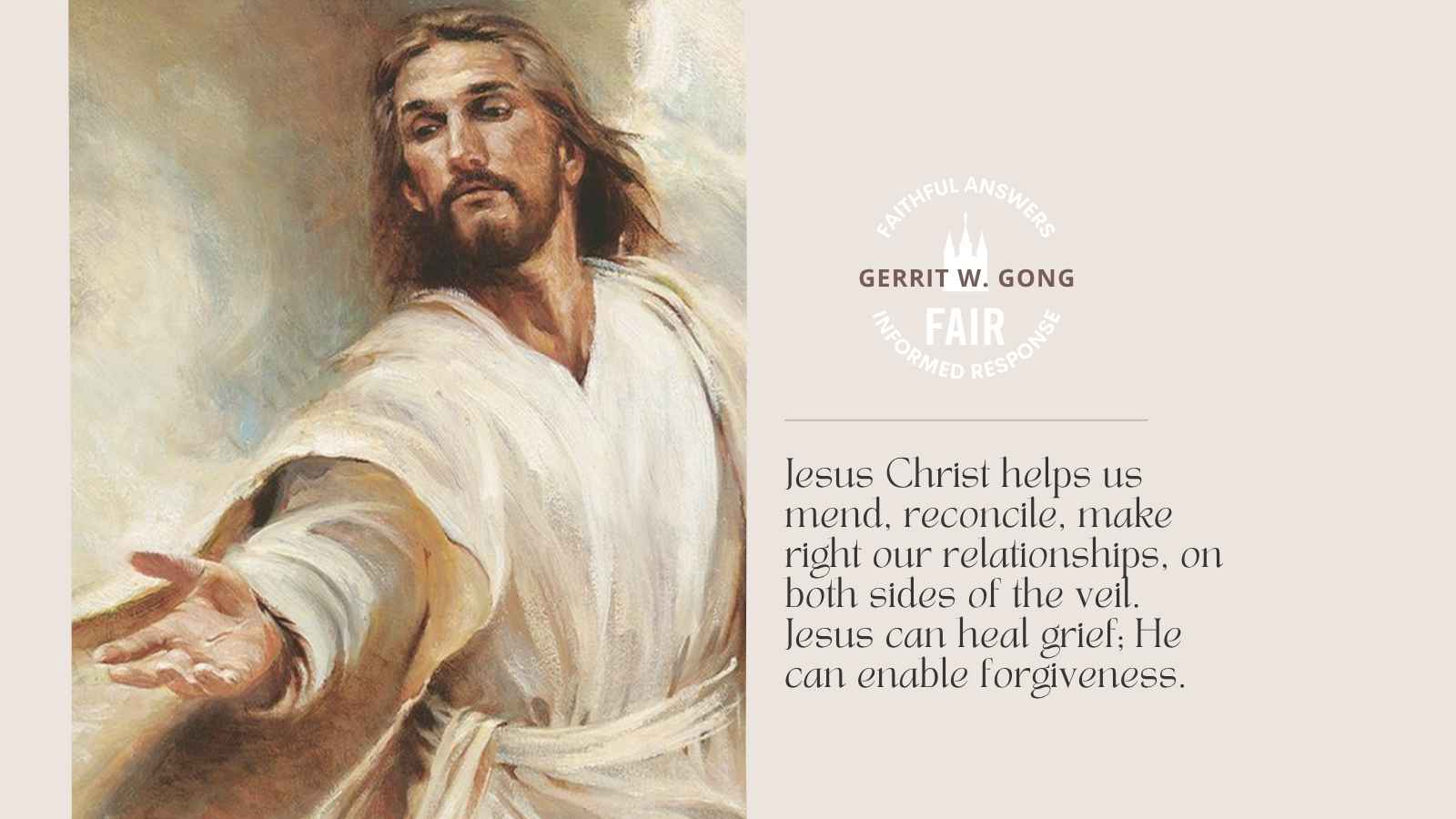
Apologetic Application: Receiving Christ’s Gifts Requires Agency and Willingness
Elder Gerrit W. Gong’s talk underscores a doctrinal truth with powerful apologetic value:
God’s gifts are universal in offer—but conditional in reception.
At the heart of this message lies a doctrinal triad:
- The Atonement of Jesus Christ – offered to all for the redemption of sin and sorrow (Alma 7:11–13).
- The Resurrection – a universal gift, unconditionally granted to all who have lived (1 Corinthians 15:22; Alma 11:42–44).
- The Restoration of the Gospel – a divine process to empower willing disciples through priesthood authority, covenants, and revelation (D&C 76:42–43; 2 Nephi 30:8).
Elder Gong teaches that Christ’s mission is not to coerce but to heal, lift, and liberate—as much as we are willing to receive.
Defending Core Beliefs
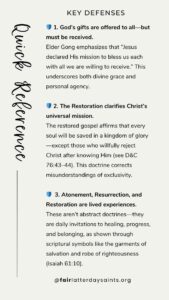 1⃣ Salvation ≠ Forced Equality.
1⃣ Salvation ≠ Forced Equality.
Some critics claim it’s unfair that God doesn’t give everyone the same eternal reward. But this overlooks the difference between resurrection and exaltation. Resurrection is a universal gift—a free offering through Christ to every soul. Exaltation, on the other hand, honors our agency and desires. As Elder Gong teaches:
“He saves all the works of his hands—except those who willfully deny the Son.”
God doesn’t restrict salvation—He extends it. But He also respects our choices.
2⃣ God’s Love Is Universal, Not Coercive.
Some see the plan of salvation as exclusive or elitist, but that misrepresents the doctrine. Jesus Christ came “to heal the brokenhearted… to set at liberty them that are bruised” (Luke 4:18)—and that includes all of us.
Elder Gong emphasizes that Christ’s invitation is open in “every time, every land, every circumstance.” But real love invites—it doesn’t override. God does not drag people into heaven. He empowers them to become heavenly.
Understanding that reception, not worthiness, is the gate helps dismantle the false belief that the gospel is only for the already-righteous. This view aligns beautifully with Latter-day Saint teachings on grace, growth, and accountability.
Practical Apologetic Use: When someone claims, “Your Church is too focused on rules and worthiness,” this doctrine shifts the focus: “Worthiness” isn’t about perfection—it’s about willingness. Christ meets us where we are, but He invites us to walk with Him through covenants.” This answer not only clarifies the doctrine but offers a loving, scriptural lens through which to see it.
The gospel is a gift. Discipleship is choosing to open it.
Historical and Doctrinal Connections
Throughout scripture and in every dispensation, the Lord has extended divine gifts to His children—but always with an invitation to receive them intentionally. From Adam’s covenant sacrifices to Isaiah’s Messianic prophecies to the Restoration of priesthood power, God has shown that salvation is offered freely but must be accepted willingly.
Elder Gerrit W. Gong draws on this eternal pattern by quoting Isaiah’s description of the Savior’s mission:
“To preach the gospel to the poor … to heal the brokenhearted … to set at liberty them that are bruised.” (Luke 4:18; cf. Isaiah 61)
He reminds us that this promise is as real today as it was anciently—fulfilled anew in our lives through the Atonement, Resurrection, and Restoration of Jesus Christ.
In his talk, Elder Gong affirms that the Restoration is not just a historical event—it is an ongoing promise: the Savior continues to heal, restore, and guide today through living prophets, priesthood ordinances, and the quiet power of personal revelation. The same Christ who brought “beauty for ashes” in Isaiah’s day continues to do so now.
Doctrine and Covenants 67–70 offers powerful continuity to this theme. These revelations testify that:
- It is our privilege to receive divine confirmation through spiritual means, not carnal reasoning (D&C 67:10)
- We are stewards over the sacred truths entrusted to us (D&C 70:3-4,9-12)
Just as Elder Gong teaches that we must receive what Christ offers, these sections emphasize that revelation and salvation are not passive experiences—they involve faith, stewardship, and accountability. Christ’s gifts are enduring and personal. God will give us truth, peace, and healing—but we must act in faith to claim them.
Living Apologetics: How to Apply This Today
 How can we help others understand that Christ’s gifts are real, available, and require our participation?
How can we help others understand that Christ’s gifts are real, available, and require our participation?
Elder Gong testifies that the Savior offers each of us “atonement, resurrection, and restoration—peace, becoming, and belonging.” These gifts are universal in invitation but personal in reception. Apologetically, this helps us respond to criticism that Church teachings are exclusionary or conditional. In truth, they are covenantal—meant to be received, not imposed.
Principle in Practice: Two Ways to Apply Apologetic Principles
1⃣ Reframe Accusations of Exclusivity
When someone says, “Only your church thinks it’s right,” respond:
→ “Christ offers salvation to everyone. Our doctrine teaches that He honors agency—and invites all to receive what they are willing to accept.”
2⃣ Use Isaiah’s Language to Reassure the Weary
Elder Gong quotes Isaiah’s promises to the “poor, brokenhearted, captive, blind, and bruised.” → In conversation, say: “This isn’t just poetic—it’s who Christ came to heal. And that means all of us. The gospel is for the bruised, not the perfect.”
Top Apologetic Facts
 1. Salvation is universal, exaltation is invitational.
1. Salvation is universal, exaltation is invitational.
Joseph Smith’s teachings in Doctrine and Covenants 76 boldly revealed a God who will “save all the works of His hands”—offering resurrection to all through Christ. But exaltation requires willingness and discipleship, not passive inheritance.
 2. Restoration reveals a healing, not condemning, Christ.
2. Restoration reveals a healing, not condemning, Christ.
In contrast to fire-and-brimstone portrayals of God, the Restoration affirms Jesus Christ’s mission to “heal the brokenhearted… and set at liberty them that are bruised” (Luke 4:18). His gospel is redemptive, not punitive.
 3. “Beauty for ashes” is a covenantal promise.
3. “Beauty for ashes” is a covenantal promise.
Isaiah 61:3 is more than poetic—it’s a pattern of restoration. Christ offers hope and transformation through His Atonement. As Elder Gong testifies, His gifts include atonement, resurrection, and restoration— extended to all who will receive them.
Conclusion: Receiving Heaven’s Gifts with Willing Hearts
Elder Gerrit W. Gong’s Easter message invites each of us to step into the healing, peace, and joy made possible through Jesus Christ’s Atonement, Resurrection, and the Restoration of His Church. These are not distant theological concepts—they are personal, practical gifts waiting at the threshold of our willingness.
We are not forgotten. We are not too broken. In every circumstance, Jesus Christ offers beauty for ashes, garments of salvation, and robes of righteousness. But as Elder Gong reminds us, the Savior’s gifts must be received—not just known about, or admired, or believed in abstractly, but embraced with covenantal commitment and faith in action.
This week’s Come, Follow Me lesson underscores the same truth: stewardship, accountability, and trust in God’s word prepare us to receive His richest blessings. Through our choices, we decide whether eternity’s gifts will be symbolic… or transformative.
Are you willing to receive what Christ is already offering?

“May we each find in Jesus Christ atonement, resurrection, and restoration—peace, becoming, and belonging—that which is enduringly real and joyful, happy and forever.” — Elder Gerrit W. Gong
The Consider Conference series by FAIR offers an in-depth look at recent General Conference talks to help members of the Church of Jesus Christ of Latter-day Saints navigate common questions, misunderstandings, and criticisms. Each post provides doctrinal insights, historical context, and practical ways to apply gospel principles in everyday conversations. Through this series, we hope to equip readers with faith-promoting resources that encourage thoughtful reflection, respectful dialogue, and a stronger foundation in gospel truths, fostering both personal conviction and meaningful discussions with others.
The post Beauty for Ashes appeared first on FAIR.
Continue reading at the original source →




